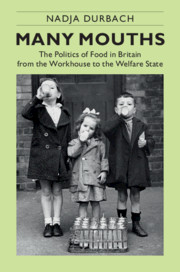Book contents
- Many Mouths
- Many Mouths
- Copyright page
- Dedication
- Contents
- Figures
- Acknowledgments
- Introduction
- 1 Old English Fare
- 2 Gendered Portions and Racialized Rations
- 3 Famine, Cooked Food, and the Starving Child
- 4 Tommy’s Tummy
- 5 The Science of Selection
- 6 Every Sort and Condition of Citizen
- 7 Nations Out of Nurseries, Empires into Bottles
- Conclusion
- Notes
- Bibliography
- Index
6 - Every Sort and Condition of Citizen
British Restaurants and the Communal Feeding Experiment during World War II
Published online by Cambridge University Press: 27 March 2020
- Many Mouths
- Many Mouths
- Copyright page
- Dedication
- Contents
- Figures
- Acknowledgments
- Introduction
- 1 Old English Fare
- 2 Gendered Portions and Racialized Rations
- 3 Famine, Cooked Food, and the Starving Child
- 4 Tommy’s Tummy
- 5 The Science of Selection
- 6 Every Sort and Condition of Citizen
- 7 Nations Out of Nurseries, Empires into Bottles
- Conclusion
- Notes
- Bibliography
- Index
Summary
Chapter 6 analyzes the communal feeding centers opened during World War II that initially targeted the working poor in order to ameliorate their deficient diets and boost morale. They provided well-balanced, inexpensive meals that attempted to meet the nutritional standards devised by the state’s scientific advisors. These British Restaurants eventually came to serve a broad cross section of the civilian home front population, not merely the working poor. But this was not the product of a coherent government policy. Rather, this chapter demonstrates that it was the result of a proactive public who used these not-for-profit services for their own purposes and thus became not merely passive recipients of government food control policies but active agents in the project of mass feeding. This chapter explores these institutions as spaces of cross-class and heterosocial encounters, which were frequented by a range of people who generally enjoyed the food and the atmosphere. It concludes that British Restaurants were politically popular both because they reflected a wartime “fair shares” mentality and because they served a larger project that was bent on transforming the poor from beneficiaries of the state into citizen-consumers and thus full members of an economically healthy postwar society.
Keywords
- Type
- Chapter
- Information
- Many MouthsThe Politics of Food in Britain from the Workhouse to the Welfare State, pp. 178 - 210Publisher: Cambridge University PressPrint publication year: 2020

